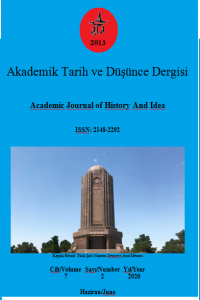Klaudio Maqrisin İtaliya Postmodernizminin İnkişafında Rolu
Mərkəzi Avropanın postmodern quruluşunun mənzərəsini göstərmək aspektindən Klaudio Maqrisin 1986-cı ildə nəşr olunan “Dunay boyunca” (“Danubio”) kitabı son dərəcə əhəmiyyətlidir. Alman ədəbiyyatında yaranan əsas əsərlərdən biri kimi “Dunay boyunca”da Maqris Orta Avropanı bir çox ideoloji inancın və böyük inqilabi ümidlərin süqutunun şahidi olduğumuz dünya teatrı kimi təsvir edir.1990-cı illərin əvvəllərində, yəni Mərkəzi Avropada kommunizmin dağılmasından, Berlin Divarının sökülməsindən və Sovet İttifaqının süqutundan dərhal sonra Mərkəzi Avropa Qərb tərəfindən kəşf edilmişdir. Kitab bütün Avropada böyük diqqət görmüş və bir sıra dillərə, o cümlədən İsveç dilinə tərcümə edilmişdir. Kitab bütün Avropada böyük diqqət görmüş və bir sıra dillərə, o cümlədən İsveç dilinə tərcümə edilmişdir. Məqalədə Maqrisin əsərlərində yer alan postmodern elementlər tədqiq olunmuşdur. Qeyd edək əsasən bioqrafik, real, tarixi faktlar və hadisələr fonunda yazılan əsərlərində Maqris müxtəlif zamanlarda yazılan əsərlərə işarələr edərək, həmin yazarların əsərləri ilə intertekstual əlaqədə dövrü təsvir etmişdir.
Anahtar Kelimeler:
Klaudio Maqris, postmodernizm, italyan ədəbiyyatı, orta avropa, qərb.
The Role of Claudio Magris in the Development of Italian Postmodernism
Claudio Magris (April 10, 1939, Trieste) is an Italian writer, translator, and academic. He graduated from the Faculty of German Language and Literature at the University of Turin. He worked in the Italian Senate in 1994-96. With Danubio ("Danube"), published in 1986, he is recognized as one of the greatest contemporary Italian writers and won the Bagutta Prize. In 1997, he received the Strega, Italy's most important literary award, for his book "Microcosms". In 2016, the writer was awarded the Literature Prize named after Franz Kafka. In 2007, he was nominated for the Nobel Prize. In 2015, the novel "Non luogo a procedure" ("Rejection of the case") had a great impact on society and was chosen as the best novel of the year by the literary supplement of the newspaper "Corriere della Sera", Magris was declared the best writer of the year on this occasion. Claudio Magris's book "Danube" ("Danubio"), published in 1986, is extremely important from the point of view of showing the picture of the postmodern structure of Central Europe. In "Danube", one of the main works of German literature, Magris describes Central Europe as a world theater where we witnessed the collapse of many ideological beliefs and great revolutionary hopes. Central Europe was discovered by the West in the early 1990s, immediately after the collapse of communism in Central Europe, the demolition of the Berlin Wall and the fall of the Soviet Union. In the article, the postmodern elements in the works of Magris were studied. It should be noted that in his works written mainly against the background of biographical, real, historical facts and events, Magris made references to the works written in different times and described the period in intertextual relationship with the works of those authors.
Keywords:
Claudio Magris, postmodernism, Italian literature, Central Europe, the West.,
___
- Argibay. J. P. (2012). Literatura e Interculturalidad: José Saramago, Claudio Magris y Albert Camus. Madrid.
- Arkalı, M. Y. (2012). Hayat treninde felsefi bir yolculuk. Cinius Yayınları.
- Loriggio, F. (1996). Myth, Mythology and the Novel: Towards a Reappraisal. Theories of Myth
- (Ed. Robert A. Segal). 233-252). Garland Publishing.
- Magris, C. (1996). Il mito asburgico nella letteratura austriaca moderna. Einaudi.
- Magris, C. (2017). Mikrokozmoslar: YKY.
- Yayın Aralığı: Yılda 6 Sayı
- Başlangıç: 2013
- Yayıncı: Hakan YILMAZ
Sayıdaki Diğer Makaleler
Klaudio Maqrisin İtaliya Postmodernizminin İnkişafında Rolu
Bir Dilbilimci Olarak Temmâm Hassân: Hayatı, Fikirleri ve Eserleri
Some Questions of Modern Library and Information Marketing
Elchin AHMADOV, Nigar SEYİDLİ (GULİYEVA)
Alish AGAMİRZAYEV, Nigar SEYİDLİ (GULİYEVA)
Bağımsız Kazakistan'ın Modernizasyon Aşamaları
Meiramkul ISSAYEVA, Auelgazina Tolkyn KUDAİBERGENOVNA
Telfik’in İcma ile İlişkisi, Onun Gerçekleşme şekli ve Mezheblerin Buna Yaklaşımı
Fatma SEDES, Canan AKHÜSÜK BOZKURT
İngilis Dilinin Dünya Dili Kimi Əhəmiyyəti və Öyrədilmə Metodları
Phraseological units in which complex and compound numbers are used in English
